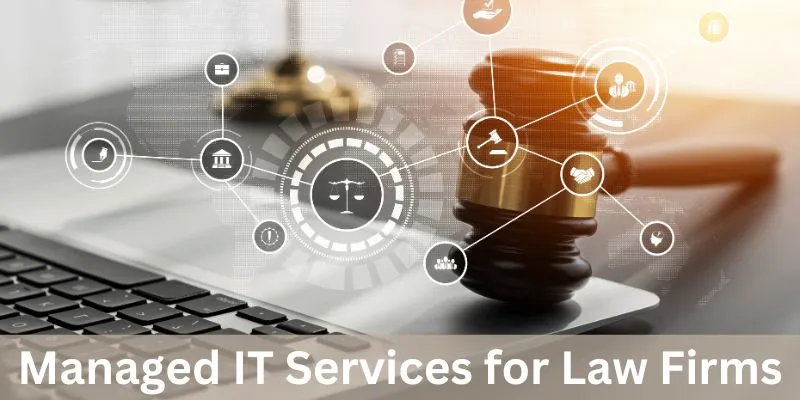
Benefits of Managed IT Services for Law Firms and How its Works
Managed IT services refer to the practice of outsourcing the management and maintenance of an organization’s IT systems and networks to a specialized third-party provider. For law firms, these systems play a crucial role in ensuring smooth day-to-day operations, safeguarding sensitive client data, and staying ahead in an increasingly competitive legal landscape.
The importance of managed IT services lies in safeguarding sensitive client data and maintaining operational efficiency. These services offer 24/7 monitoring, proactive maintenance, and expert assistance, unlike in-house solutions prone to downtime and security breaches.
Common Challenges Faced by Law Firms
- Security Concerns: Managed IT services address security gaps, protecting sensitive legal data from breaches.
- Compliance Requirements: Providers ensure adherence to legal and industry-specific compliance standards.
- Scalability Issues: As law firms grow, managed services scale seamlessly to accommodate changing needs.
- Technology Integration: Providers integrate diverse technologies, streamlining operations.
Benefits of Managed IT Services for Law Firms
1. Enhanced Security and Compliance
Law firms deal with highly sensitive client information, making data security and regulatory compliance paramount. Managed IT services implement robust cybersecurity measures, including firewall protection, intrusion detection, and regular security audits to safeguard against cyber threats and ensure compliance with industry regulations such as HIPAA and GDPR.
2. 24/7 Monitoring and Support
With managed IT service providers, law firms benefit from round-the-clock monitoring of their IT systems. Any potential issues or vulnerabilities are identified and addressed promptly, minimizing downtime and optimizing performance. Additionally, dedicated technical support is available at all times to resolve any IT-related issues efficiently.
3. Scalability and Flexibility
As law firms grow and evolve, their IT needs change accordingly. To address these evolving needs, managed IT services offer scalable solutions that can adapt to the firm’s requirements, whether it involves expanding the infrastructure, adding new users, or integrating additional software applications. This flexibility ensures that the firm’s technology remains aligned with its business objectives.
4. Cost Efficiency
Outsourcing IT management to a managed services provider eliminates the need for in-house IT personnel and infrastructure investments. By partnering with an MSP, law firms can benefit from predictable monthly expenses and pay only for the services they use. This cost-effective approach frees up valuable resources, allowing firms to allocate them more efficiently and focus on core legal activities.
5. Data Backup and Disaster Recovery
Loss of critical data can have severe consequences for a law firm, ranging from financial loss to reputational damage. Managed IT services implement robust data backup and disaster recovery solutions, including regular backups, redundant storage, and recovery protocols, to ensure business continuity even in the face of unforeseen events.
6. Improved Collaboration and Mobility
In today’s digital age, collaboration and mobility are essential for modern legal practice. Managed IT services facilitate seamless communication and collaboration among team members, regardless of their location, through cloud-based solutions, file sharing platforms, and mobile device management. Therefore, lawyers can work efficiently from anywhere while maintaining access to important case files and documents.
How Managed IT Services Work for Law Firms
- Assessment and Planning: The process begins with a comprehensive assessment of the law firm’s existing IT infrastructure, workflows, and security posture. Based on the findings, a tailored IT strategy and roadmap are developed to address the firm’s specific needs and goals.
- Implementation and Integration: Managed IT services providers deploy the necessary hardware, software, and security measures to optimize the firm’s IT environment. This may include setting up servers, configuring network infrastructure, and integrating software applications such as case management systems and legal billing software.
- Monitoring and Maintenance: Once the IT infrastructure is in place, ongoing monitoring and maintenance ensure its smooth operation and security.
- Support and Troubleshooting: Technical support is available around the clock to assist lawyers and staff with any IT-related inquiries or issues they may encounter. Whether it’s troubleshooting software glitches, or resetting passwords.
- Continuous Improvement: Managed IT services providers continuously evaluate the firm’s IT environment and processes to identify areas for improvement.
Conclusion
Managed IT services offer a multitude of benefits for law firms seeking to optimize their technology infrastructure, enhance security, and improve efficiency. By partnering with reliable and trusted managed IT services provider, like Sagenext, law firms can focus on delivering exceptional legal services to their clients while leaving the complexities of IT management to the experts. With 24/7 support, proactive monitoring, and scalable solutions, managed IT services pave the way for a more agile, resilient, and competitive legal practice in today’s digital era.
FAQ’s
What does a lawyer do in a tech company?
A lawyer in a tech company typically handles legal matters related to the company’s operations, such as intellectual property protection, contract drafting and negotiation, regulatory compliance, and handling legal disputes. They ensure that the company’s activities adhere to relevant laws and regulations in the technology industry.
How does technology help lawyers?
Technology aids lawyers in numerous ways, including:
- Boosting efficiency: Automating tasks, managing documents, and streamlining communication save lawyers valuable time.
- Enhancing research: Legal databases and AI-powered tools help lawyers find relevant case law and precedents faster.
- Improving security: Cloud storage and encryption safeguard sensitive client data.
- Facilitating collaboration: Online tools enable lawyers to work together seamlessly, regardless of location.






